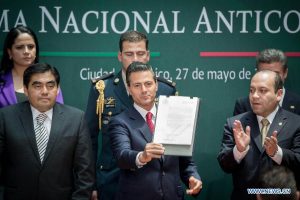 [1]Guest post by Jonathan Adams, a partner at Baker & McKenzie [2] in Mexico City.
[1]Guest post by Jonathan Adams, a partner at Baker & McKenzie [2] in Mexico City.
On July 18, President Enrique Peña Nieto signed into law the implementing legislation for the Mexican National Anticorruption System. The newly minted laws include the General Law for the National Anticorruption System; the Organic Law for the Federal Tribunal on Administrative Justice; and the General Law of Administrative Responsibilities. These long-awaited laws fundamentally complete the constitutional reforms of May 27, 2015, which in turn were a result of campaign promises made during 2012 by then-candidate Peña Nieto.
Among the new laws, this post highlights the salient features of the General Law of Administrative Responsibilities (“GLAR”). This law establishes administrative duties and responsibilities for public servants and private parties, as well as applicable sanctions, and the procedures for their application.
The scope of the GLAR includes all public servants and private parties (legal entities and individuals) that engage in “serious administrative offenses.” (By definition, “non-serious administrative offenses” can only be committed by public servants.) Specifically, legal entities commit “serious administrative offenses” when the acts are carried out by individuals acting in their name or representation.
Pursuant to a line-item veto by the President, Congress passed the GLAR with an amendment to Article 32. As amended, this article will require only public servants to file a statement of assets, statement of interests, and annual tax return (Ley 3 de 3). The vetoed text of the article extended this requirement to any individual or legal entity that received or managed public resources.
Under the GLAR, “serious administrative offenses” applicable to private parties include: bribery, illegal participation in administrative procedures, influence-peddling, falsification of information, collusion, wrongful use of public resources, wrongful hiring of ex public servants.
Administrative sanctions for individuals include: fines of up to twice the amount of the acquired benefits or around US$600,000; debarment from 3 months to 8 years; and damages. For legal entities, the sanctions include: fines of up to twice the amount of the acquired benefits or around US$6 million; debarment from 3 months to 10 years; suspension of activities for between 3 months and 3 years; dissolution; and damages.
Nevertheless, legal entities can qualify for mitigating factors established in the law. First, the authority may consider as a mitigating factor in applying sanctions if the legal entity had a compliance program in place at the time of the illicit conduct. In addition, self-reporting and cooperation with authorities in the official investigation can qualify as a mitigating factor in the application of sanctions. Specifically, a person may self-report and obtain significant sanctions reductions, of between fifty and seventy percent of the amount of the sanctions otherwise imposed; or up to the totality of the sanction for cases of debarment.
The administrative process through which guilt is determined and sanctions are imposed has two additional important features. First, the standard of proof is “beyond a reasonable doubt,” which is normally the criminal guilt standard. Second, the statute of limitations for “serious administrative offenses” is 7 years from the date the offenses were committed, or from the moment in which they ceased. This is longer than the analogous criminal statute of limitations.
With this legislation, Mexico joins the group of countries with broad-scope anti-corruption legislation. This is especially relevant in light of the unenviable position Mexico has occupied in global corruption perception reports for many years. This legislation will be very important for companies established in Mexico and must be considered along-side the extra-territorially enforced laws of other countries, such as the US FCPA. Understanding the prohibitions of this law is an important first step. But even more important is the opportunity to create and implement corruption prevention mechanisms.
The opinions expressed in this post are those of the author in his or her individual capacity, and do not necessarily represent the views of anyone else, including the entities with which the author is affiliated, the author`s employers, other contributors, FCPAméricas, or its advertisers. The information in the FCPAméricas blog is intended for public discussion and educational purposes only. It is not intended to provide legal advice to its readers and does not create an attorney-client relationship. It does not seek to describe or convey the quality of legal services. FCPAméricas encourages readers to seek qualified legal counsel regarding anti-corruption laws or any other legal issue. FCPAméricas gives permission to link, post, distribute, or reference this article for any lawful purpose, provided attribution is made to the author and to FCPAméricas LLC.
© 2015 FCPAméricas, LLC